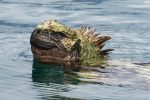Is iguana a descendant of the dinosaurs? It’s not surprising at all for me listening to this such question. Perhaps, this thought also one of many reasons people fell in love with iguanas; how they have the same appearance with primordial creatures dinosaurs. From the skin structural, and the jagged-like skin that attach on iguana’s back; everything just seems to be the same like the dinosaurs. However, if now, you already have an iguana friend as your companion, you should make sure that you have given the best care to them.
For people who didn’t have yet but on process of considering it, you could purchase iguanas on pet stores, or you could adopt an iguana from shelters and foster cares. Iguanas are pretty complicated animal; they do exhibit a lot of various behaviors to deal with every day. Inherited the wildness from their ancestor, I thought everyone who decided keep them as pet should be prepared for whatever possibility that might happen (included the bite or scratch in your face).
Furthermore, as herbivorous reptile there are 3 best foods you could give to iguanas based on the classification (for more details, please click the link). In short, the main diet foods of iguanas are the green leafy, vegetables, and fruits. Not only the foods, you also need to learn the best ways to bath an iguana, because they were basically didn’t really a cuddle type of animal, so you need to know basic skill that would make your iguana feel comfortable and less-irritate with your touch.
However, ladies and gentlemen, to fulfill your curiosity of the correlation between iguana and the dinosaurs, let’s find out together in this article: is iguana a descendant of the dinosaurs?
Do Dinosaurs are the Ancestors of Iguanas?
A lot of study was held by the researchers due to learn about the evolution of dinosaurs on the modern animals; which animals are shared the same constituent substances, and the truth was come out that lizards are one of the animal that have been proved shared the same ancestor with dinosaurs. You must understand, that lizards are part of reptilians group; the surprising fact about reptiles is that the evolution of reptiles had happened even before the dinosaurs existed. That is mean that reptiles ancestor was way older than the evolution of dinosaurs.
Is that possible if the reptiles ancestor shares some constituent particles with dinosaurs ancestor? I am afraid the answer is no my friends. Both of reptiles and dinosaurs did once have the same ancestor, which is the reptiles. But, one day, a group called archosaurs was created and branched away from reptilians species. Furthermore, this archosaurs group was the one that evolved to the animals species that now we knew as dinosaurs, crocodiles, and petrosaurs. So, how about the lizards and iguanas; where they came from?
Iguanas and lizard was evolved from the pure reptiles group that did not branch into the group that we have learned before, the archosaurs. So, rather than thinking that iguanas are descendant of dinosaurs, let’s take a turn and ask the real question: do the great dinosaurs are the descendant of reptiles? Because after learned our material above, the conclusion have been made that archosaurs is a branch of reptiles; it makes other conclusion that dinosaurs are created from the same ancestors as the lizards and iguanas.
The only differences between the two of them is that iguanas are the pure-blood of reptiles and the dinosaurs had been created by DNA mutations which resulted into the new branch of species. However, what is archosaurs? How can they split from the reptiles? We would learn it now.
Archosaurs
Archosaurs was part of a group called diapsid amniotes which is the representative of crocodilians and birds in our modern days. Not only crocodiles and birds, the extinct dinosaurs also being part of archosaurs species. The group that had been known as the ancestor of the crocodilians and birds was named archosauria. Furthermore, there are two different clades in archosaurs: the first one is Avemetatarsilia and the second one is Pseudosuchia.
The Avemetatarsilia species was included the birds and other extinct relatives of its; and the Pseudosuchia species was included crocodiles and other extinct relatives. Furthermore, the archosaurs appeared in the late Permian; this idea apparently become topic of debate that lead into the two different group of people: ones are believed that in archosaurus rossicus and the ones who believe in protorosaurus speneri. However, both of archosaurus rossicus and protorosaurus speneri believed had been evolved during the early stage of Triassic – specifically the Olenekian.
The extinction of some archosaurs species such as pterosaurs and non-avian dinosaurs during the creteceous-Paleogene event; the event happened about 66 millions year ago. The only species survived from the extinction period was crocodilians and birds. Because of birds and crocodiles are descendants of archosaurs, then basically archosaurs was classified under phylogenetic taxonomy.
However, now people, you know that the pure descendant of dinosaurs isn’t the iguanas or other lizards (although the share the same appearance), but it was crocodilians (which is included alligators, gharials, and corocodiles) and birds (especially the Holocene).
Differences between Iguanas and The Dinosaurs
Not, only separated by the period of time, there are basic fundamental differences between the two of them: the skeletal. You could see the differences even at the first glance that all lepidosaurs (snakes, lizards, tuatara, and others fossil) and the archosaurs (dinosaurians, and living crocodiles and birds) belong to different subclasses. In zoologists, although we do agreed that dinosaurs are shared morphological as reptiles, still, the differences of structural skeletal couldn’t be covered.
They were significantly different; the most protrude difference was seen in triradiate pelvis of Archosauria. The dorsal margin in dinosaurs was expanded along with the ilium and then articulated with three to four fused of vertebrates; meanwhile in lizards (included iguanas) the alium would dorsally extend and articulated with unfused two sacral vertebrates.

